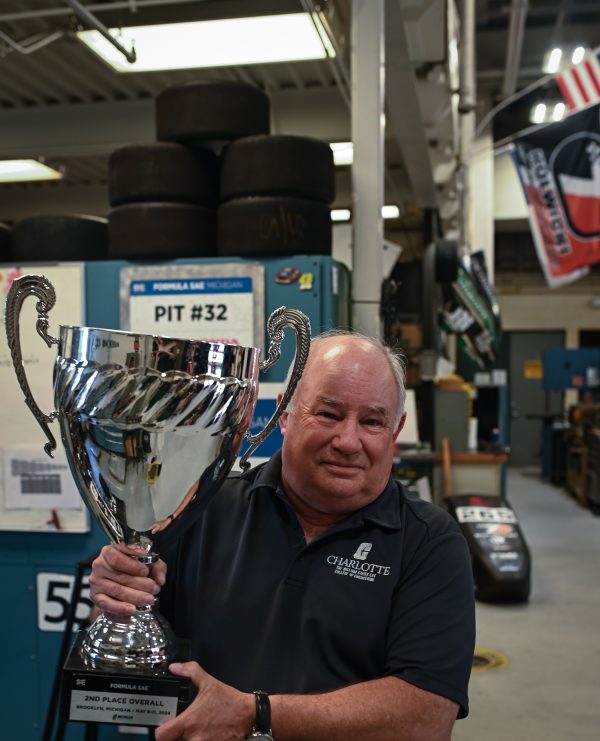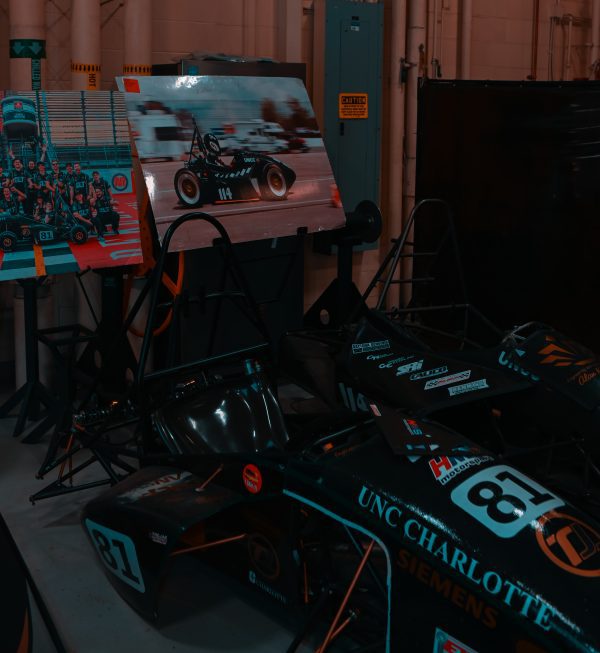Meet Jim Fox

Jim Fox is the research operations manager of the Kulwicki Motorsports Lab . His journey with motorsports began at a Formula 1 event in Germany, leading to a distinguished career with organizations that included Hendrick Motorsports and Team Penske. Learn about how Fox mentors student teams and what he enjoys beyond work.
Tell us about your journey to becoming the research operations manager for the Kulwicki Lab and your role in the motorsports program at Charlotte?
My journey began in Nürburgring, Germany. As a child, I attended the 1965 Formula 1 event with my father, an Air Force fighter pilot, and watched Jim Clark win. That moment sparked my passion for motorsports. After serving in the Air Force, I drag-raced motorcycles, won two championships at Virginia Beach Raceway and worked for Master Machine and Tool in Newport News, Virginia. I completed my State of Virginia apprenticeship and earned master machinist credentials. I also helped professional Top Fuel motorcycle racers and designed parts for them, which turned into a business. In 1992, I contributed to Kenny Bernstein’s historic 300 MPH run.
Since then, I’ve worked with Hendrick Motorsports, KB Racing and Team Penske, winning championships in various racing series. Now at the Kulwicki Lab on campus, I bring lessons learned from top motorsports teams to enhance our program. We’ve restructured the motorsports program to provide real-world experience to our students, making them highly sought-after motorsports engineers. Our focus on the Formula SAE program allows students to design and build Formula style race cars, competing globally and gaining skills that are attractive to professional racing teams.
What are some of the key responsibilities you have in mentoring student race car teams at Charlotte?
As lab manager, I provide students with machinery, tooling and knowledge to manufacture race cars safely. I mentor the Formula SAE teams, sharing my design and manufacturing experience. We collaborate on ideas, materials, processes and efficient manufacturing. I also produce parts in-house to save time and money.
What skills do you believe are most crucial for students looking to succeed in the motorsports industry?
Our motorsports students gain hands-on experience in the lab, complementing their classroom learning. This practical experience is akin to a med school graduate with surgical practice. Our students learn teamwork, innovation, meeting deadlines, adhering to rules and leadership skills. FSAE programs produce great engineers who are recognized by race teams worldwide.
Aside from motorsports, what are some of your hobbies or interests outside of work?
In my spare time, my wife and I travel when possible. I also garden and am restoring a 1949 Chevrolet 3800 truck. I’m still involved in motorcycle racing with Hands Performance Top Fuel Drag Bike.
What’s your go-to pump-up song or playlist before a big race or event?
I enjoy the songs “Wish You Were Here” by Pink Floyd and “Another One Bites the Dust” by Queen. Both are inspiring.
Please share a bit about the impact you hope to leave through your work with student leaders in the motorsports industry.
I hope to leave a legacy of “effort equals results,” a lesson learned from “the captain” Roger Penske. Small efforts yield small results, while large efforts produce large results. I take pride in seeing our graduates succeed in the racing workforce.
What are your hopes and goals for the future of the Kulwicki Lab and the motorsports program at Charlotte?
Since joining the Kulwicki Lab, I’ve been authoring a comprehensive manual, “How to Run the Kulwicki Lab.” It includes lab goals, safety, vendor contacts and equipment information. My goal is to secure the lab’s future and ensure continued success. Our FSAE IC team has steadily improved, finishing second globally this year. I believe our Electric FSAE team will achieve a solid finish in the 2025 competition. I’m fortunate to work with the Kulwicki Foundation, our teams, faculty and staff.







